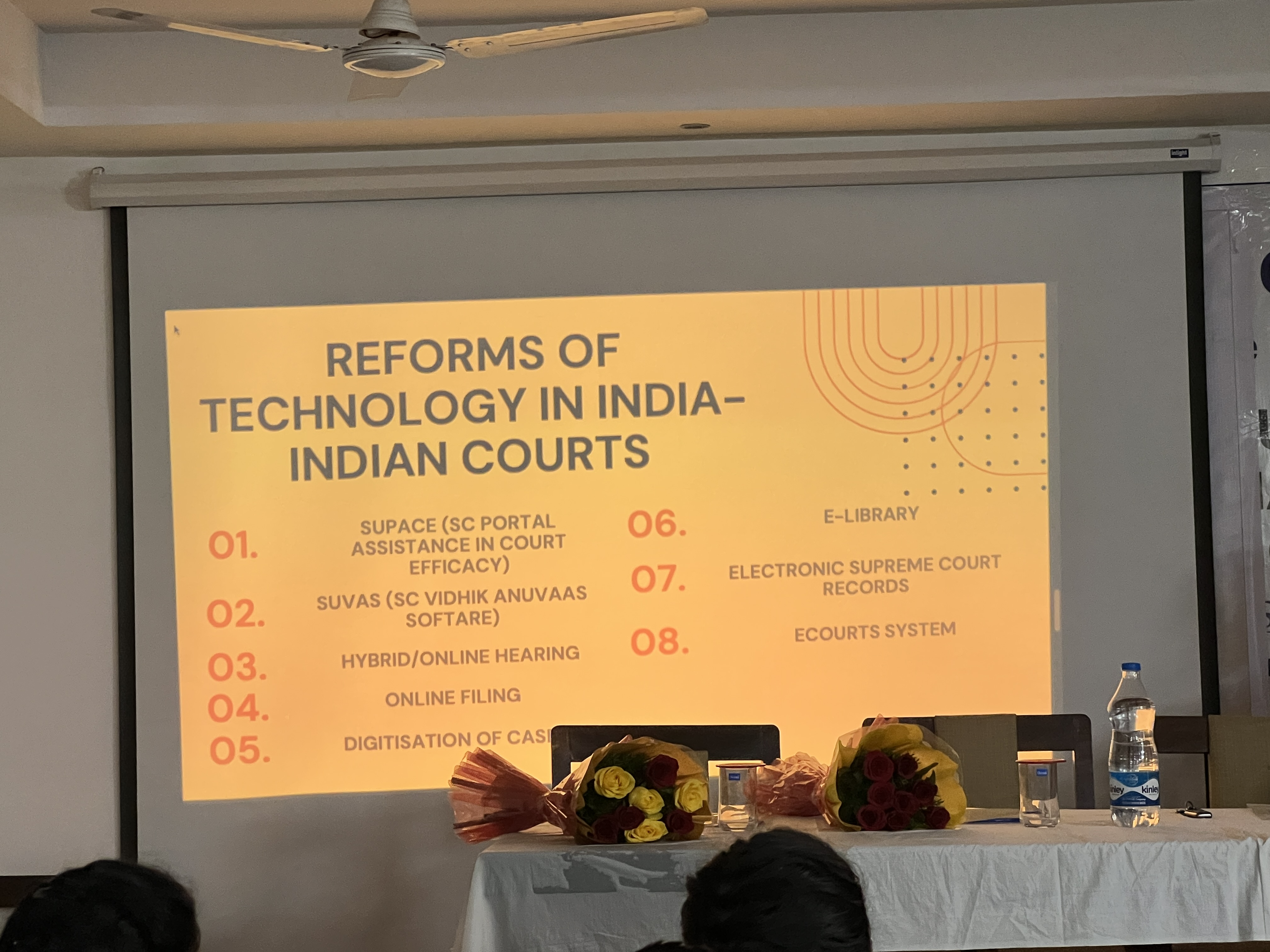Post Covid, the world of law has changed for the better. The integration of technology into the legal profession is no longer a future possibility—it is a present reality. A session at Padala Rama Reddi Law College delved deep into how advancements like artificial intelligence, blockchain, and digitisation are reshaping the legal sector while also addressing associated challenges.
Aly Basith and Anindita S Chander from Allied Law Partners were the speakers for this session. Over the course of 90 minutes, they took us through the good, the bad and the ugly of the penetration of AI into the legal profession and how the future looks for would be advocates.

The Role of Artificial Intelligence (AI) in Law#
Artificial intelligence is revolutionising traditional legal practices by enabling efficiency and accuracy in various aspects, including:
Legal Research: AI tools significantly ease the process of finding relevant case laws and legal precedents. No more poring over AIR or SCR to find cases, write out complete questions and you will get responses that are relevant to you in Manupatra or SCC Online.
Due Diligence: Advanced algorithms help in quickly verifying facts and identifying potential risks in any contracts. ‘Legal opinion’ is needed before you buy any real estate to make sure it is alright. The advocate’s job is going to be 100s of times easier with these AI infused technologies, especially in larger and more complex contracts.
Prediction of Outcomes: AI can predict case outcomes based on historical data, empowering legal professionals with actionable insights. In the US, there are prediction tools like Ross that analyse the leanings of the judge and the past history of their cases and predict the outcome of a particular case. Advocates can use that information to draft their strategies accordingly.
Contract Drafting: Automated tools assist in drafting error-free contracts at scale. Most normal people aren’t probably going to any advocate for any simple agreements such as lease agreements. They are going to open ChatGPT and mention the details and say “Generate” and they will have a superb contract ready for them. Whether it will work in case of a dispute in case of a court is a different story.
Patent Applications and E-Discovery: Accessing and processing large datasets is now faster, thanks to AI-powered solutions. Patent applications require 1000s of minute details to be written in order for it to be filed. AI will eliminate the issues.
Legal discovery is when junior advocates search for the important documents inside the submissions made by the other party. To confuse the advocates, they send 100s of files to bury these people in paperwork. With e-discovery, none of that will exist. People can easily find what they need.
For example, when Kingfisher was acquiring Air Deccan, there were 3 aircraft hangars full of files and 7 days to decide on the deal. Vijay Mallya went with his ‘gut’ and the rest is history.
All of these changes are sure to eliminate 100s of jobs in AI. Especially if you are not using AI in your work flows and you are simply someone that checks for simple things.
How Technology is Transforming the Legal Sector#
Technology is reshaping the legal profession in numerous ways:
Higher Convenience and Automation: From online filing systems to automated workflows, legal professionals now enjoy reduced errors and streamlined processes.
Before Covid, there was a Maruti Omni Van that their senior advocate had and it had 3 duffel bags full of case files. Today, all they carry are an iPad. Even their seniors are using only iPads despite being in their 50s and 60s. It is orders of magnitude more easy.
Remote Work and Virtual Hearings: High Courts and Supreme Court allow advocates to argue the case online. The judge sits in the court but the advocate can argue from anywhere.
Document and Case Management: With dozens of cases running simultaneously, advocates have challenges figuring out what case is due and what documents are pending and they often miss court dates. Advanced management systems systematically organise and digitise case files for easy access and updates. It will tell you when the case is due, it will mark it on your calendar, it will ensure that you have all the documents necessary and they are signed by the clients.
Blockchain for Secure Contracts: Blockchain technology is gaining traction for its ability to ensure secure, tamper-proof contract management. It is the tech that powers bitcoin, the digital currency. They didn’t talk much about this.
Access to Justice: Initiatives like e-courts and digital filing systems are making legal aid more accessible to marginalised communities. Today, you can open any court in the country and see the docket order on the website without any issues.
Risks and Negative Impacts of Technology in Law#
Despite its advantages, technology poses certain risks to the legal system:
- Cybersecurity Threats: Increased reliance on digital systems exposes sensitive legal data to potential cyber-attacks. There is no law in India as of today that makes this punishable. The IT Act 2013 does not cover most of these crimes. Police and judiciary are clueless.
- Client Dependency: Over-reliance on technology-generated simulations for legal advice may lead to unrealistic expectations. They may come better prepared and think that they are in the right. Doctors used to be annoyed with patients ‘googling’ their symptoms and coming back. Advocates are going to have the same problem.
- AI Bias and Data Breaches: Inherent biases in AI systems and risks of client data breaches threaten the integrity of the legal process. AI refuses to talk about certain topics, this can be a problem.
- Job Displacement: Automation may render some traditional legal roles obsolete, necessitating the upskilling of professionals. Most basic level advocates are going to be gone. Juniors will have to learn better skills to thrive.
Technology Reforms in India’s Legal System#

Before Covid, India had ancient processes for everything. Fortunately for us, the former Chief Justice of India DY Chandrachud pushed for the reforms that transformed the Indian judiciary forever. Today, India is at the forefront of adopting technology in its legal framework. Notable reforms include:
- SUPACE (Supreme Court Portal for Assistance in Court Efficiency): Enhances efficiency in judicial functioning through AI-driven solutions.
- SUVAS (Supreme Court Vidhik Anuvaas Software): Translates judgments into several Indian languages.
- E-Library and Electronic Supreme Court Records: Digitisation of legal resources for easy retrieval. These records are machine searchable.
- E-Courts System (National Judicial Grid): Access to case status from home, access to judgment copy for High courts and Supreme Court.
- Digitised Case Records: Case records are searchable for whatever we need. AI can bring you answers to the exact question you have.
Impact of Technology on Legal Education and Practice#
Technology has also influenced how legal professionals are trained and operate:
- Legal Education Made Easy: Digital tools and online resources simplify complex legal concepts for students and professionals alike. Most colleges (including mine) are yet to adopt the AI assisted tools for learning.
- Virtual Learning Platforms: There is a lot to learn from watching the live streams of various high courts, using tools like Manopatra to scour the right insights from various cases to help build your own case.
Preparing for the Future: Adapting to Change#
To thrive in this technology-driven era, legal professionals must:
Upskill Continuously: Master emerging technologies like AI, blockchain, and advanced legal software. Aly and Aninditha said that they wanted to hire interns/juniors who were extremely skilled with these tools rather than people who were keen on the old school methods.
Specialise: Focus on niche areas such as cybersecurity law, intellectual property, or digital forensics. There is a lot of competition and it is not going to be possible to be a master at everything, instead, it is important to focus on a 1 or 2 core areas and become extremely good at them.
Adopt Ethical Practices: Using AI tools may seem easy but you must remember that you are still responsible for the output and what you publish or send out into the world. Your name is going to be signed and you are accountable for any mistakes.
Whatever AI generates, needs to be looked at and vetted by an expert such as you.
Conclusion & My Thoughts#
Tech infused law is here to stay, there is no way we can go back to the previous era of paper. Whatever paper-based systems exist are only here for a few years and everything may change in the coming years.
I personally feel that while all big lawyers and law firms are going to have the best lawyers, the best software or perhaps both. I feel that the big winners from AI aided law would be the advocates with independent practices. They can do 10x more work with the same resources and help 10x more clients. While in cities like Hyderabad, there is no dearth of advocates, in smaller towns and cities there are often only a small bunch of advocates and they don’t have the resources to apply themselves well. They also make only a small sum from their practice.
The session covered pros and cons of technology in law. It also covered how the profession has changed over the past decade since the speakers started off in their own law journeys. If there was one aspect I missed, I felt like there should have been a 10-minute session where they demonstrated how to use AI to draft a contract. By merely watching it happen live on screen, people would have been mesmerised.
All things being said, I felt good that Dr Kalyani and one Mr Ravi made this session happen. It was one such session that opened up the minds of several students and faculty members. While I was already optimistic about the use of tech in law, it was nice to learn about the before and after of law.
Downloads:
